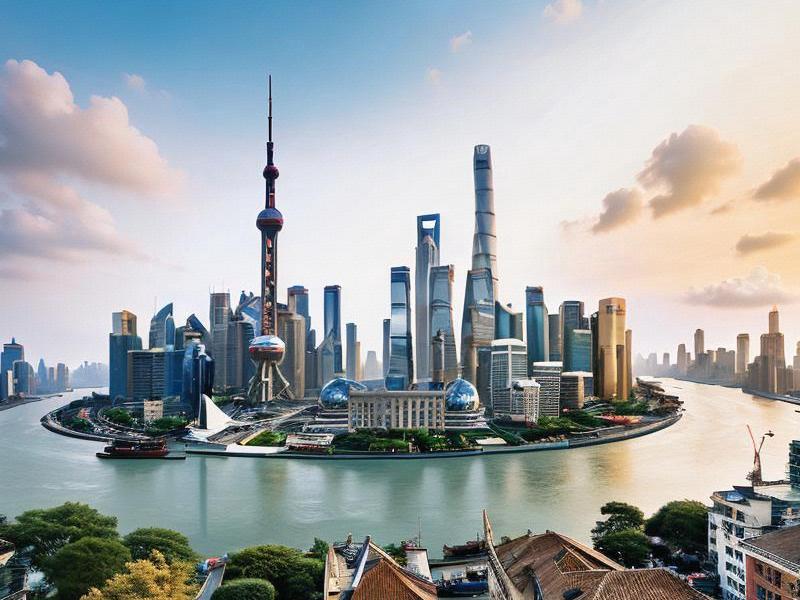
Shanghai, the bustling metropolis on the banks of the Huangpu River, has long been a symbol of China's rapid economic growth and urbanization. Over the past few decades, the city has undergone a remarkable transformation, evolving from a historical port city into a global hub of culture, economy, and innovation. This renaissance of Shanghai is not just a testament to the city's resilience and adaptability but also a reflection of China's broader aspirations to reclaim its place on the world stage.
Historical Legacy and Urban Development
Shanghai's story begins in the 19th century when it was forced open to foreign trade as one of the treaty ports under the unequal treaties imposed by Western powers. This period saw the emergence of the International Settlement and the French Concession, areas that became melting pots of cultures, architectures, and ideas. The Bund, with its iconic skyline of colonial-era buildings, stands as a living museum of this era.
However, the 20th century was a tumultuous time for Shanghai. The city witnessed the rise and fall of warlords, the Japanese occupation, and the Chinese Civil War. Despite these challenges, Shanghai managed to maintain its status as a major financial and commercial center.
In the post-reform era, Shanghai embarked on an ambitious urban development program aimed at transforming it into a world-class city. The Pudong New Area, once a rural hinterland, was developed into a symbol of modernity with towering skyscrapers, state-of-the-art infrastructure, and a vibrant business environment. The iconic Oriental Pearl Tower and the Jin Mao Tower are testaments to this transformation.
Economic Transformation and Global Hub
新夜上海论坛 Shanghai's economic transformation is nothing short of extraordinary. From being a relatively small industrial city, it has grown into China's largest and most important economic center. The city is home to the Shanghai Stock Exchange, one of the largest stock exchanges in the world, and a key player in global finance.
The development of the Pudong area has been a game-changer for Shanghai. The Lujiazui Financial District, often referred to as the "Wall Street of China," houses some of the world's largest banks, multinational corporations, and financial institutions. The establishment of the China (Shanghai) Pilot Free Trade Zone in 2013 further solidified Shanghai's position as a gateway to international trade and investment.
Shanghai's economic success is not limited to finance. The city has also emerged as a leader in technology, manufacturing, and logistics. High-tech parks like Zhangjiang Hi-Tech Park and漕河泾新兴技术开发区 (Chuancheng New Technology Development Zone) have attracted numerous startups and tech companies, fostering innovation and entrepreneurship.
Cultural Revival and Global Influence
While Shanghai's economic achievements are well-documented, its cultural revival is equally noteworthy. The city has made significant efforts to preserve its rich heritage while embracing modernity. The restoration of historic buildings, the revitalization of traditional neighborhoods, and the promotion of cultural festivals have helped Shanghai reclaim its identity as a cultural capital.
The Bund and the Former French Concession are now popular tourist destinations, offering a glimpse into the city's colonial past. The Shanghai Museum, with its extensive collection of Chinese art, and the Power Station of Art, a former power plant turned contemporary art gallery, are among the city's cultural landmarks.
夜上海419论坛 Shanghai has also become a global center for the arts, hosting international film festivals, music concerts, and theater productions. The city's vibrant art scene is reflected in galleries, street art, and public installations. The 2010 World Expo, which was hosted by Shanghai, showcased the city's ability to organize large-scale international events and left a lasting legacy of urban development and cultural exchange.
Urban Challenges and Sustainability
Despite its many achievements, Shanghai faces several challenges in its journey towards becoming a global city. Rapid urbanization has led to issues such as traffic congestion, air pollution, and housing shortages. The city government has implemented various measures to address these challenges, including the expansion of public transportation, the promotion of green energy, and the development of affordable housing.
Sustainability is a key focus for Shanghai's future development. The city aims to become a low-carbon, resource-efficient, and environmentally friendly metropolis. Initiatives such as the construction of green buildings, the promotion of electric vehicles, and the development of smart city technologies are part of this vision.
Global City Aspirations
上海花千坊龙凤 Shanghai's aspirations to become a global city are not just about economic and cultural dominance but also about contributing to global governance and addressing global challenges. The city has actively participated in international organizations and forums, advocating for sustainable development, free trade, and multilateralism.
Shanghai's role in the Belt and Road Initiative (BRI) is a testament to its global ambitions. As a key node in the BRI, the city is playing a crucial role in connecting China with the rest of the world through infrastructure development, trade, and investment.
Conclusion
Shanghai's renaissance is a story of resilience, adaptability, and ambition. From its historical roots to its modern-day achievements, the city has demonstrated an unparalleled ability to reinvent itself. As Shanghai continues on its journey towards becoming a global city, it remains a beacon of hope and inspiration for other cities around the world.
The transformation of Shanghai is not just a local phenomenon but also a reflection of China's broader aspirations to reclaim its place on the world stage. As the city continues to grow and evolve, it will undoubtedly play a pivotal role in shaping the future of global urbanization, culture, and economy.
In conclusion, Shanghai's journey from a historical port city to a global hub of culture, economy, and innovation is a testament to the power of human ingenuity and determination. The city's efforts to preserve its heritage while embracing modernity, address urban challenges, and contribute to global governance make it a model for sustainable urban development. As Shanghai continues to rise, it will undoubtedly leave an indelible mark on the world.
